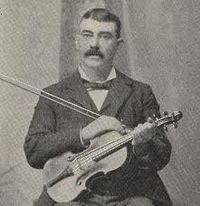Annotation:Johnny's Gone to France (2): Difference between revisions
m (Text replace - "[[{{BASEPAGENAME}}|Tune properties and standard notation]]" to "'''Back to [[{{BASEPAGENAME}}]]'''") |
No edit summary |
||
| Line 31: | Line 31: | ||
<br> | <br> | ||
---- | ---- | ||
'''Back to [[{{BASEPAGENAME}}]]''' | =='''Back to [[{{BASEPAGENAME}}]]'''== | ||
Revision as of 04:17, 11 May 2013
Back to Johnny's Gone to France (2)
JOHNNY'S GONE TO FRANCE [2] (Ata Seanin/Seaganin Imtigte Go Fraince/Frainnc). AKA and see "Sun Behind Glenties (The)." Irish, Reel. G Major. Standard tuning (fiddle). AB (O'Neill/1001): AA'B (O'Neill/Krassen): AABB (Cole).
Source for notated version: "McFadden" [O'Neill]. Chicago fiddler John McFadden was born around 1850 in the townland of Carrowmore, just north of Westport, County Mayo, into a musical family (his father and brother were also fiddlers). He did not read music but was a quick aural learner and had an enormous repertoire, and was a master of improvisation and variation. McFadden also composed tunes. O'Neill (Irish Minstrels and Musicians, p. 296) relates:

While visiting Sergt. (James) Early during a theatrical engagement in Chicago in 1911, "Patsy" Touhey, on the writer's suggestion, tried to learn "Hawk's Hornpipe" from McFadden. Phrase by phrase they progressed, Touhey submitting patiently to many minor changes according to "Mac's" fancy, until he thought he had the tune noted correctly. Then he played it, apparently in good style, but not to his preceptor's satisfaction evidently. "Let me show you, 'Patsy'," says "Mac", in a kindly tone, and swinging his bow again ran the tune over once or twice. "Why, man alive, that's not how you gave it to me at all! You've changed the tune again; I gues we'll let it go this time," exclaimed Touhey, as he started to play something else on his pipes.
The fiddler was known as an incorrigible practical joker, and whether Touhey was the victim of this predilection, or if McFadden was simply could not help but vary a tune, O'Neill does not say.
Printed sources: Cole (1000 Fiddle Tunes), 1940; p. 18. O'Neill (Krassen), 1976; p. 138 (appears as "Johnny Has Gone to France"). O'Neill (Music of Ireland: 1850 Melodies), 1903; No. 1437, p. 266. O'Neill (Dance Music of Ireland: 1001 Gems), 1907; No. 674, p. 120. Ryan's Mammoth Collection, 1883; p. 41.
Recorded sources:
